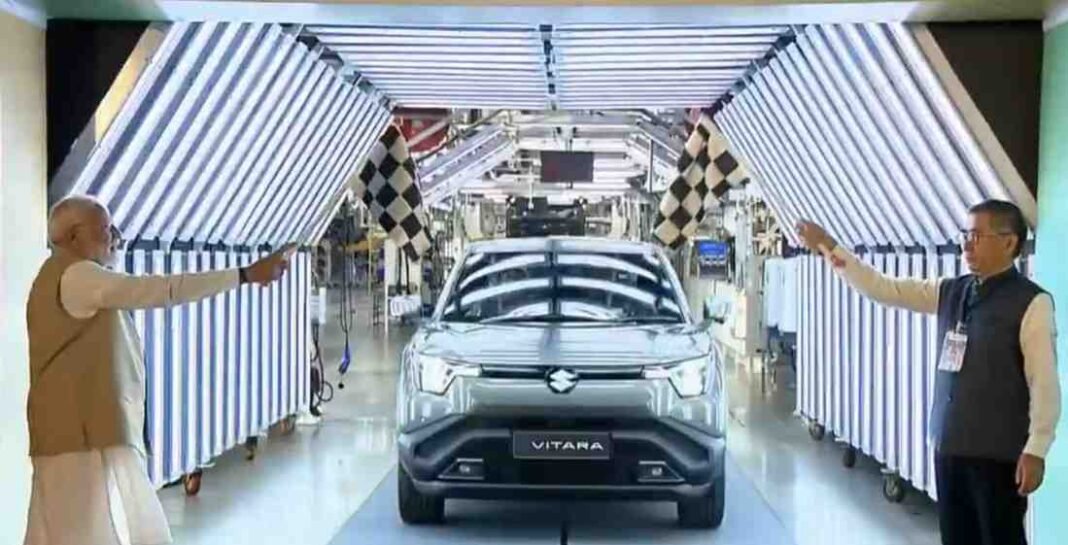PM Modi Flags Off Maruti Suzuki e-Vitara in Gujarat
Historic Milestone for India’s EV Journey
Prime Minister Narendra Modi on Monday inaugurated a landmark initiative at Maruti Suzuki’s Hansalpur facility in Gujarat by flagging off the first Made-in-India e-Vitara. This move not only marks India’s growing capabilities in electric vehicle (EV) manufacturing, but also positions the country as a significant player in the global shift towards sustainable mobility.
The e-Vitara is Maruti Suzuki’s first fully electric SUV to roll out of India, and production at Hansalpur is expected to cater to both domestic demand and international markets. With India steadily pushing toward its clean energy and electric transition goals, this milestone highlights the country’s potential to become a global manufacturing hub for EVs.
Prime Minister @narendramodi flags off the ‘e-VITARA’, Suzuki’s first global strategic Battery Electric Vehicle (BEV), at the Suzuki Motor plant in Hansalpur, Ahmedabad
Watch: ⬇️ pic.twitter.com/b4JbDQUcLn
— PIB India (@PIB_India) August 26, 2025
Gujarat’s Hansalpur Plant Becomes EV Hub
The Hansalpur plant, already a critical base for Suzuki Motor Corporation in India, is set to be the global manufacturing hub for the e-Vitara. From here, vehicles will be exported to more than 100 countries, beginning with the United Kingdom as the first destination.
The plant also inaugurated another major project — the country’s first hybrid battery electrode production facility, which will support the domestic ecosystem for electric mobility. Together, these two projects underline Gujarat’s growing role as the center of India’s automotive and clean-energy industry.
Dignitaries Present at the Event
The inauguration was attended by Gujarat Chief Minister Bhupendra Patel and Japan’s Ambassador to India, Keiichi Ono. The presence of high-level dignitaries underscored the deep India-Japan partnership in technology and clean energy. Suzuki Motor Corporation’s collaboration with India has long been pivotal in shaping the country’s automobile industry, and the new initiatives reaffirm that bond.
📡LIVE Now 📡
Prime Minister @narendramodi inaugurates production of hybrid battery electrodes at TDS Lithium-Ion Battery Plant in #Gujarat
Watch on #PIB's 📺
➡️Facebook: https://t.co/ykJcYlNrjj
➡️YouTube: https://t.co/fuM1UJtMtUhttps://t.co/b81zIcDE7d— PIB India (@PIB_India) August 26, 2025
PM Modi Calls It “A Special Day”
In a previous statement, Prime Minister Modi had called the inauguration “a special day in India’s quest for self-reliance.” He emphasized that the manufacturing of the e-Vitara and battery electrodes within India reflects the nation’s Atmanirbhar Bharat (self-reliant India) vision.
Highlighting the global impact of this achievement, Modi noted that India is no longer just a consumer of cutting-edge technology but also a producer and exporter. The fact that the very first unit will be shipped to the UK is symbolic of India’s rising credibility in the international EV market.
Maruti Suzuki’s EV Strategy
Maruti Suzuki, India’s largest carmaker, has been preparing for a significant electric push as part of its long-term strategy. The e-Vitara represents the company’s foray into battery-powered mobility at scale, designed with performance, range, and affordability in mind.
The company’s choice to begin exports right from the first batch of vehicles shows confidence in the global competitiveness of Indian-made EVs. With production localized in Gujarat, Maruti Suzuki is also expected to contribute significantly to the growth of India’s EV supply chain, from batteries to ancillary components.
Boost to India’s Green Mobility Goals
The rollout of the e-Vitara comes at a time when India has set ambitious net-zero emissions targets by 2070 and aims for 30% of new vehicle sales to be electric by 2030. Manufacturing EVs domestically and exporting them globally will not only create jobs and reduce dependence on imports but also strengthen India’s position as a clean mobility leader.
The hybrid battery electrode plant complements this by building critical domestic capability, reducing reliance on foreign suppliers, and ensuring long-term energy security.
A Global Outlook for Indian EVs
With over 100 export markets in sight, the e-Vitara could be a game-changer for Indian EVs in terms of brand reputation and acceptance. If successful, India’s role as an EV exporter will rise sharply, opening doors for more models and variants to follow suit.
Industry experts believe this is just the beginning of India’s large-scale entry into the EV race, with the Hansalpur model potentially being replicated in other states.
Conclusion
The inauguration of the e-Vitara at Hansalpur is more than just a product launch — it’s a declaration of India’s intent to lead the world in clean mobility. With the Prime Minister’s support, Suzuki’s expertise, and Gujarat’s infrastructure, India is poised to drive the next phase of the electric revolution.
As the first unit heads to the UK, it carries not just the Maruti Suzuki brand but also the aspirations of a self-reliant and sustainable India.








